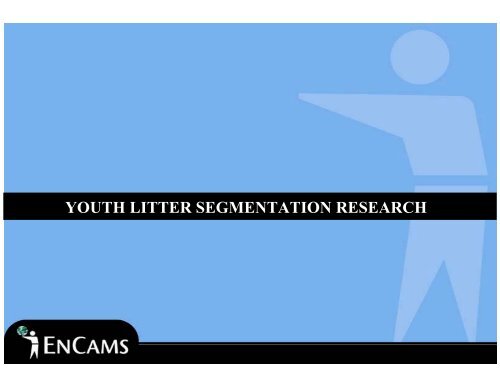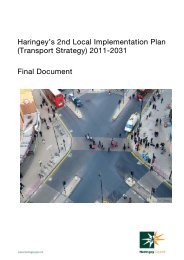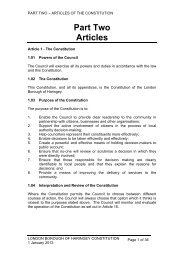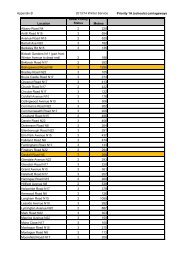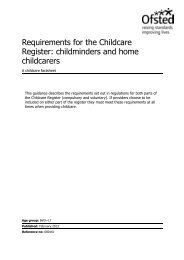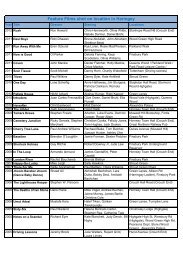YOUTH LITTER SEGMENTATION RESEARCH
YOUTH LITTER SEGMENTATION RESEARCH
YOUTH LITTER SEGMENTATION RESEARCH
Create successful ePaper yourself
Turn your PDF publications into a flip-book with our unique Google optimized e-Paper software.
<strong>YOUTH</strong> <strong>LITTER</strong> <strong>SEGMENTATION</strong> <strong>RESEARCH</strong>
Research Objectives<br />
Method & Sample<br />
Littering Habits<br />
Focusing On The Schools<br />
School Approaches To Litter And Pupil Suggestions<br />
Opinions Of Other Current Anti-Litter Schemes<br />
Attitudes Towards Anti-Litter Stimuli<br />
Attitudinal Segmentation<br />
Conclusions
<strong>RESEARCH</strong> OBJECTIVE<br />
“To understand the littering behaviour of secondary school<br />
children with particular emphasis on their behaviour at school”<br />
ACHIEVED BY:<br />
• Understanding their opinions of Litter<br />
• Determining why they litter<br />
• Determining the effectiveness of current anti-litter measures at school<br />
• Ascertaining reactions to a range of litter-related stimuli<br />
• Grouping the behaviours of pupils into attitudinal segments<br />
• Exploring the ideal anti-litter measures for schools
METHOD AND SAMPLE: Stage 1<br />
• 6 standard length focus groups and 12 Friendship paired depths<br />
• Single sex groups and paired depths - Male quotes in black italics;<br />
Female quotes in red italics<br />
• Schools selected: ‘Less desirable’, ‘More desirable’, ‘Catholic’, ‘Private’<br />
• Groups and depths split by age per group/depth:<br />
– Year 8/9 quotes shown not underlined in relevant colour<br />
– Year 10/11 quotes shown underlined in relevant colour<br />
– Mix of ethnicity
SPONTANEOUS IMAGE OF ‘<strong>LITTER</strong>’<br />
• For most pupils, the word ‘rubbish’ immediately sprang to<br />
mind<br />
• The appearance of litter was often mentioned “Anywhere you<br />
go you can see it”; “Makes the place look horrible”<br />
• Other phrases associated were (in order) unwanted items,<br />
pollution, should be in the bin, harming the environment, rats<br />
• The actual items mentioned most often were (in order)<br />
– Crisp bags, cans, bottles, paper, fast food packaging (and the<br />
food), chewing gum
THE ‘BEST’ VS THE ‘WORST’ TYPE OF <strong>LITTER</strong><br />
WORST<br />
Condoms<br />
Dog dirt<br />
Cans<br />
Rotten takeaway food<br />
Chewing gum Plastic bottles<br />
(NB girls)<br />
BEST<br />
Small paper<br />
(wrappers etc)<br />
Fruit peel/Apple cores/bread<br />
Glass bottles<br />
“My friend cut her knee<br />
open when she fell on a<br />
can”<br />
“Chewing gum is really<br />
annoying when you sit in it<br />
and it ruins your favourite<br />
trousers”<br />
“Animals will eat<br />
bits of fruit”<br />
“You don’t just throw one<br />
type of litter do you”<br />
A few stated that ‘nothing’ is ‘best’
WHY DOES THIS AGE GROUP <strong>LITTER</strong>?<br />
• The most common - almost universal - response was that ‘people of their<br />
age group’ could not be bothered to do anything else with unwanted<br />
items<br />
• This response was justified with the following reasons, and applied to both<br />
at school and elsewhere:<br />
– Laziness “It saves going to the bins doesn’t it”; “We are all just too lazy to<br />
bother”<br />
– Not enough bins “There’s never a bin when you need it”; “There can be no bins<br />
for miles”<br />
– Bins were full/overflowing/surrounded by wasps “There are lots of bins in<br />
the park but they are dirty and full of wasps”<br />
– Less effort than having to find a bin “There are bins around the school but<br />
people just can’t be bothered”; “It’s easier to just chuck it away”<br />
– Pockets would get smelly/dirty “There aren’t enough pockets in your clothes”;<br />
“Don’t want your pockets to stink”
WHEN WOULD THEY BE MOST LIKELY <strong>LITTER</strong>?<br />
• Most stated that children in gangs/groups were most likely to litter, as it was<br />
‘the done thing’ “You wouldn’t really put it in a bin at school with your mates,<br />
it’s a bit embarrassing”; “If you’re in a group then you would throw it away<br />
instead of binning it”<br />
• If they were not with their parents “My parents are very strict, so I wouldn’t<br />
drop stuff on the floor if I was with them, otherwise I would”<br />
• They felt that there were very few occasions where they wouldn’t litter,<br />
as it was practically the norm to do so “Everybody drops litter at some<br />
stage”; “We all do it - so what?”; “We’ll drop it anywhere, everywhere really”;<br />
“I just do it without thinking”<br />
• Several felt that not being seen was the key “Some kids sneakily drop it”;<br />
“When my parents aren’t looking I might drop stuff on the floor”; “I’ll drop it on<br />
the floor but I may distract the fact that I’m doing it”
WHEN WOULD THEY BE MOST LIKELY TO <strong>LITTER</strong>?<br />
• A few did think that ‘some people’ may consider it to be a ‘cool’/’hard’<br />
thing to do - and were in some ways pressured into behaving similarly,<br />
so as not to seem ‘out of place’ “Accidentally drop it when you’re with<br />
people” “Some might think it’s cool”; “They try to be tough - but they’re<br />
not”<br />
• A few of the older pupils were nearing the end of their school careers<br />
(leaving after GCSEs) so they had little regard for school littering rules<br />
“They treat us like children, we won’t be here much longer though”<br />
• The most likely locations were (in order): School (lunchtime), outside<br />
shops, at night, not near a bin
WHAT STOPS THEM <strong>LITTER</strong>ING?<br />
• Parents and school had the greatest effect:<br />
– Upbringing/Education “I don’t litter because my mum told me not to”; “They are<br />
always going on about it in assembly”<br />
– Chance of being caught (few) “I wouldn’t do it at school, the teacher might catch<br />
me”<br />
– Not when parents were around “Kids are mostly brought up not to litter, but they<br />
won’t listen much anyway”<br />
• The other main reason revolved around appearance of an area, as many stated that<br />
they would be unlikely to litter near their home “Don’t want to live in a dirty<br />
environment”; “Don’t want around our house to look trampy”; “It doesn’t look nice<br />
when people litter so I don’t”<br />
• Only a handful saw it as an environmental issue “They don’t have the environment on<br />
their mind when they aren’t littering”; “More aware of what it can do to the environment<br />
I suppose”<br />
• NB When talking about ‘not littering’, most pupils talked about ‘other people’, when<br />
talking about littering, most referred to themselves and others
THE REASONS FOR <strong>LITTER</strong>ING<br />
LAZINESS, NO BIG DEAL<br />
NO BINS NEARBY<br />
WOULDN’T USE<br />
ONE ANYWAY<br />
Uncool<br />
Group pressure<br />
Hard<br />
CAN’T BE<br />
BOTHERED<br />
Clean pockets<br />
Perceived effort<br />
No importance/consequence<br />
attached to act
TRUE CONFESSIONS<br />
Pupils were asked to anonymously note down the last time that they littered,<br />
and the situation that they were in. All (including the few who felt that it was<br />
down to ‘other people’) readily confessed - and were less embarrassed to do<br />
so than adults. Almost all were very recent events<br />
• The most frequently-littered items were (in order)<br />
– Crisp bags, sweet wrappers, bits of paper, cans, chewing gum, plastic drinks<br />
bottles, cigarette packets, cigarette ends, and one mention for each of tissue,<br />
barbecue sauce pot, alcopop bottle, apple core<br />
• The most likely situations and reasons were (in order)<br />
– No bins nearby/no bins, with friends, couldn’t be bothered, out of a car window, ‘fell<br />
out’ of a pocket accidentally, playing football, in a mood, dark, baiting the<br />
headmaster, adding to a pile of litter, missing a bin<br />
• The most likely locations were (in order)<br />
– School, near shops, on a bus, at the park, at a cinema/lane/alley/back of a<br />
pub/under a bench
“A crisp pack on the way<br />
home from school, GCSE<br />
work was catching up<br />
with me and I was in a<br />
mood”<br />
“There’s only one<br />
way to get the<br />
Head to come out<br />
of his room - to<br />
throw litter”<br />
“An apple core out the<br />
window of a car, nowhere<br />
else to put it and it’s not too<br />
bad because it’ll feed<br />
animals and stuff”<br />
TRUE CONFESSIONS<br />
“I was chilling in a park<br />
drinking Red Square with<br />
a friend - I was on one<br />
end of the bench, the bin<br />
was on the other”<br />
Happy to tell the truth<br />
“I was near the bin<br />
at school and threw<br />
it but missed the bin<br />
and didn’t pick it<br />
up”<br />
“A barbecue sauce pot<br />
by the leisure centre<br />
with my friends, I didn’t<br />
want to hold it, it was<br />
messy and it would have<br />
ruined my pocket”<br />
“Accidentally<br />
dropped my sweet<br />
wrapper and<br />
couldn’t be<br />
bothered to pick it<br />
up”<br />
“I put a can on a pile<br />
of other litter, there<br />
were no bins but it<br />
didn’t harm because<br />
the pile was already<br />
there”
THE REASONS FOR <strong>LITTER</strong>ING<br />
<strong>LITTER</strong>ING WAS REGARDED AS THE<br />
NORM IN MOST SITUATIONS<br />
Few felt guilty about it<br />
Littering is a thoughtless act<br />
They had very low awareness or<br />
concern regarding consequences<br />
It was a very low level taboo, only<br />
becoming important for some when<br />
parents or teachers enforced it
Focusing On Their Schools
HOW DIFFERENT ARE THEIR SCHOOLS?<br />
• In order to ascertain whether schools could be segmented according<br />
to type, all pupils were asked a set of questions to determine the<br />
general disciplinary approach of their school:<br />
The policy on school uniform<br />
The policy on truanting<br />
The policy on bullying<br />
The general attitude of teachers<br />
and specifically towards littering<br />
The general attitude of the head<br />
and specifically towards littering
HOW DIFFERENT ARE THEIR SCHOOLS?<br />
THEY SPOKE VERY SUBJECTIVELY<br />
ABOUT THEIR SCHOOLS DEPENDING ON<br />
Their own behaviour<br />
Their own recent experiences<br />
Their general attitudes to discipline issues<br />
They struggled to compare the discipline at their own school<br />
with that at other schools through lack of knowledge
HOW DIFFERENT ARE THEIR SCHOOLS?<br />
However, the recruitment successfully identified less<br />
desirable and more desirable schools based on local<br />
knowledge, reputation, location and selection procedure<br />
And headmasters have differing inclinations<br />
regarding carrot vs. stick<br />
Therefore offering a range of solutions for different<br />
schools would make sense
HOW DIFFERENT ARE THEIR SCHOOLS?<br />
- UNIFORMS -<br />
• Almost all of the schools had a regimented uniform policy “Ours is all green”<br />
• A handful had no set uniform, but insisted upon certain standards “Sensible<br />
clothes only”<br />
• Regardless of whether the school was ‘desirable’ or ‘less desirable’, catholic<br />
or private, there was little way of determining a specific policy or type:<br />
• More desirable: “They are shouted at and sent home and their parents are<br />
rung if they don’t wear it”; “They do notice high heels but they aren’t as strict<br />
as with trainers”<br />
• Less desirable: “There’s always teachers going around telling you to put your<br />
blazers on”; “Unless you bring a letter saying why you get a detention”<br />
• For a few, the detention punishment was often litter picking
HOW DIFFERENT ARE THEIR SCHOOLS?<br />
- TRUANTING -<br />
• For all types of school, the punishment was quite similar, depending on the<br />
frequency and attitude of the pupil:<br />
‘Best’ Punishment<br />
Put on report<br />
“I did it - I got referred to<br />
the deputy head and put on<br />
report for a few weeks”<br />
Detention<br />
Weeks Detention<br />
Parents called<br />
Suspension<br />
Expulsion<br />
‘Worst’ Punishment<br />
“You get isolated,<br />
put in a class on<br />
your own”<br />
“If you aren’t a bad<br />
pupil you won’t get as<br />
much punishment or<br />
attitude from the<br />
teachers”
HOW DIFFERENT ARE THEIR SCHOOLS?<br />
- BULLYING -<br />
• The policy seemed to vary depending on the severity of the incident<br />
• Calling Parents was generally the first option: Desirable -“The deputy<br />
talks to them about why they did it and then phones their parents”;<br />
Less Desirable - “The parents are brought in and they talk it through”<br />
• Ultimately it could lead to suspension or expulsion “Take them out<br />
of the system - they get suspended”<br />
• There were a handful of pupils (who realised littering was wrong) for<br />
whom the bullying policy had not worked “There is a bullying policy<br />
but nothing really happens”
HOW DIFFERENT ARE THEIR SCHOOLS?<br />
- TEACHER ATTITUDE TOWARDS <strong>LITTER</strong> -<br />
• All commented that every school had some teachers who were stricter than others<br />
• The stricter teachers tended to be seen as ‘picking on’ pupils, and were more annoyed<br />
regarding uniforms and especially littering “Some won’t say a thing about your tie,<br />
others wait while you do it up”; “Sometimes if you haven’t dropped litter the teacher<br />
comes round and makes you pick it up anyway”; “The deputy head shouts at you and<br />
spits in your face”<br />
– They would almost certainly then punish the pupils “They put you on litter duty once<br />
they’ve spotted you doing it”<br />
• The less strict teachers tended to give pupils the option to pick litter up, and then drop<br />
the matter “They don’t let you off but they will give you another chance first”<br />
• All agreed that the littering policy was therefore inconsistent, as different teachers had<br />
their own ways of dealing with the problem<br />
• A few felt that the teachers were hypocrites, because they had seen them littering<br />
“They drop litter, but we’re made to pick it up”
HOW DIFFERENT ARE THEIR SCHOOLS?<br />
- HEAD ATTITUDE TOWARDS <strong>LITTER</strong> -<br />
• Around 2/3 of the head teachers were male, 1/3 female<br />
• As with teachers, the ‘strictness’ varied, although most did agree that they<br />
were (unsurprisingly) more likely to ensure rules were not broken:<br />
– Uniforms: “He insists that you keep the uniform on all the way home and he<br />
drives around and shouts at you if you don’t”<br />
– Littering: “If he catches you littering he’ll make you do the stick thing for a<br />
week”; “If you are near litter he’ll try and make you pick it up so you try and avoid<br />
him”<br />
– General discipline: “She’s horrible, she’ll shout at you as you walk down the<br />
corridors”; “She’s awful, makes a real show of you if you’re caught doing stuff<br />
and shouts at you”<br />
• NB Again, the littering approach was inconsistent - albeit less so
HOW DIFFERENT ARE THEIR SCHOOLS?<br />
- DO THEY TAKE ‘CITIZENSHIP’ CLASSES?-<br />
• Almost all took classes known as PSE - ‘Personal Social Education’<br />
– A minority knew them as ‘PSDevelopment’ or PSReligiousE’<br />
• Most had covered littering and the environment at some point in the past “We did<br />
something on littering a couple of years ago”; “We had someone come in once and talk<br />
about recycling, that we should recycle more paper”; “We went round the area and looked<br />
at the litter and then discussed it in class - it was better than just sitting in a classroom”<br />
• A few also recalled “Doing something about litter in geography”<br />
• The main criticism of PSE was that few took it seriously, as it was not viewed as a ‘proper’<br />
lesson - either by the pupils (and in some cases) or the teachers “Sometimes it’s good cos<br />
we get people in”; “It’s boring except when we do sex and drink and drugs and stuff”; “The<br />
teacher doesn’t really bother with it, just gives us the work and isn’t interested”; “We did<br />
cover the environment in PSE, but most people don’t see it as a lesson and just doss<br />
about”<br />
Could this be better utilised as a means of informing them about litter?<br />
Interesting lessons (speakers, field trips) seem to work
School Approaches To Litter - And Pupil Views On It
DOES THEIR SCHOOL HAVE A <strong>LITTER</strong> PROBLEM?<br />
• All schools appeared to have litter in the grounds, albeit to varying degrees: “It’s<br />
not that bad at the moment”; “It’s absolutely everywhere”<br />
• Lunches and Breaktime were seen as the worst times for litter generation “It’s a<br />
mess, you can see all the seagulls come down after lunch and breaktime”; “It’s<br />
when we’re all outside, that’s the problem”<br />
• The main ‘litter hotspot’ was seen to be the playing field (particularly in the<br />
summer), as there appeared to be few bins in that location “All around the fences<br />
of the field - about a million crisp packets”<br />
• Many also saw the canteen/dining area as an issue - and the blame lay with a<br />
lack of (empty) bins “Chewing gum all over the bottom of tables in there”; “Bins<br />
get full in the canteen and so stuff is chucked at them”<br />
• Other hotspots included (in no order): playground, corridors, outside stairs,<br />
around vending machines, outside the canteen, around the school gates<br />
• The cleanest areas appeared to be the classrooms (as few were allowed to eat in<br />
them)
THE CURRENT ANTI-<strong>LITTER</strong> MEASURES<br />
UNDERTAKEN BY THE SCHOOLS<br />
• Around 1/3 of the schools instigated general litter picking tasks, not as punishment<br />
but as part of routine. This was not well received, as pupils did not like to pick up litter<br />
for no reason “We sometimes have to go and pick stuff up, it didn’t work right because I<br />
did it four times and some people only did it once”; “Each part of the school has a zone<br />
it has to clear up”<br />
– A few of these schools did have a reward on offer, but this did little to encourage them<br />
“We do have a litter picking session for each class and we get a non-uniform day as a<br />
reward - but we don’t like it”; “We did litter duty for a prize, we won a trip out but it was<br />
easy to cheat - we just picked the litter out of the bins”<br />
• There were some eating restrictions, eg only in the canteen, no eating inside, no<br />
eating in classrooms - all of which were hard to police “They did a thing where you<br />
couldn’t take anything out of the canteen, and we had to smuggle our drinks out”<br />
• Most appeared to restrict movement outside the school at lunchtime, with the<br />
exception of the 6th form “You’re not supposed to go out at lunch - but there are ways”
THE CURRENT ANTI-<strong>LITTER</strong> MEASURES<br />
UNDERTAKEN BY THE SCHOOLS<br />
• A few schools had taken the step of banning vending machines, although this<br />
tended to harbour resentment and did little to prevent littering “It got so bad they<br />
took the vending machines away, but it made no difference”<br />
– Banning chewing gum also had little effect “Chewing gum was everywhere so they said<br />
we weren’t allowed it in school anymore, but we still do”<br />
• Some schools had recycling bins for cans (and paper) usually in the canteen<br />
area, but these were usually treated as ‘just another bin’ “There is a green can bin<br />
but it gets used as a normal bin”<br />
• Some had tried to make the canteen a pleasant area to eat in, but the problem<br />
remained “If there is a bin nearby in the canteen then you chuck your stuff and if it<br />
goes in the bin then it’s fine, if not then it goes on the floor”<br />
• A few schools raised the subject in assembly “When it gets really bad, they go on<br />
about it in assembly”<br />
• One school put up posters
ANTI-<strong>LITTER</strong> PUNISHMENTS<br />
• For the vast majority of schools, the punishment for littering was litter picking<br />
“You go on ‘the truck’ - a wheelie bin that you pull around the field - we don’t have<br />
gloves or anything”; “You’re given a big postbag and made to pick up all the litter<br />
he can see”; “Going around at lunchtime with a litter picker-upper”; “If they see<br />
you drop stuff you have to fill a whole bag up”<br />
• This did seem to vary depending on the teacher “Depending on which teacher<br />
sees you, it’s almost certainly litter duty”<br />
• Other punishments mentioned by a few included:<br />
– Detention “We get put in Remove”<br />
– Cleaning tables in the canteen “They made us scrape all the gum off the bottom of<br />
chairs and tables”<br />
• Girls in particular (and a few boys) hated the thought of litter picking “I can’t stand<br />
picking other people’s litter up”
BUBBLE DIAGRAM ANALYSIS OF <strong>LITTER</strong>ING<br />
- ARE THEY PUNISHED AS OFTEN AS THEY SAY? -<br />
• All were given a bubble diagram, depicting a teacher catching two pupils littering -<br />
they were asked to state what the teacher and the pupils would be thinking<br />
• The Pupil Thoughts were, in order:<br />
– Can’t be bothered; Going to be in trouble; Saves the effort of finding a bin; No thought<br />
given - automatically done; No bins nearby; Caretakers will pick it up; ‘Teacher baiting’;<br />
Trying not to be seen; Don’t want to hold it; Try and pick it up before punished; More<br />
litter makes no difference; Regret doing it (because about to face punishment)<br />
• The Teacher Thoughts were, in order:<br />
– Detention/litter picking punishment handed out; Tell them to pick it up; Concerned about<br />
the mess; Disappointed that didn’t bin it; Stupid behaviour; Not bothered/don’t care;<br />
Hypocritical<br />
Even though they know the possibility of punishment, they don’t think<br />
about it and hope that they will get away with it
CURRENT MEASURES<br />
“We’d taken a bin<br />
bag out of the bin<br />
and pretended we’d<br />
filled it”<br />
Most measures appear<br />
to result in little difference to<br />
the problem<br />
Too many ways to<br />
‘beat the system’<br />
“Taking cans<br />
away from the<br />
canteen and<br />
getting vending<br />
machines instead<br />
made it even<br />
worse”<br />
Threat of litter picking<br />
has a small effect<br />
Restrictive measures<br />
are easily countered<br />
Only one apparent success<br />
“Everybody got told<br />
off about it in<br />
assembly, we got<br />
more bins and things<br />
got better”
IS IT OF CONCERN TO PUPILS?<br />
• Most were quite ‘matter of fact’ when asked if they were bothered by the litter at<br />
their school “You don’t really notice, you just get used to it”; “No big deal really, if it<br />
was tidier I wouldn’t notice”<br />
• A few were quite interested in improvements “It would be nice if there was less<br />
mess, not kicking rubbish around I suppose”; “At least you wouldn’t have to worry<br />
about tripping up in it”<br />
• Only a handful were very keen “You have to walk through it all”; “People might<br />
respect the school more then”<br />
• Most saw it as a joint responsibility: “They should provide the bins but we<br />
shouldn’t drop it”; “It may be our responsibility because we’re dropping it but it’s<br />
also theirs because they should try to stop us”; “If we took more care not to drop<br />
the rubbish then it wouldn’t be as bad”<br />
– However, a handful felt “That’s what the caretakers are paid for”
PUPIL’S SUGGESTIONS FOR RESOLVING THE PROBLEM<br />
• Despite the apparent apathy towards the issue, almost all volunteered a<br />
solution (in order):<br />
• More bins/bins near to playing fields was the most popular suggestion<br />
“More bins in the places where people hang out”; “The bins are miles away at<br />
the moment”<br />
• Immobile bins “Bins that can’t be kicked about”<br />
• Reward (NB both sexes, but similar number wanted punishment) “If they<br />
gave you a reward for not littering and they say ‘well done’ you may feel more<br />
inclined to do it”; “Fill a bag of litter and get a free dinner”;<br />
• Punishment (NB almost exclusively girls, but similar number wanted<br />
reward) “Punish us a lot harder, isolate us for a day”; “Consistent punishment<br />
if you’re caught”; “Punish people, no end of year trip”
PUPIL’S SUGGESTIONS FOR RESOLVING THE PROBLEM<br />
• Posters around the school “Posters showing the consequences”<br />
• More teachers patrolling “More to catch us at it”<br />
• Lessons in PSE “If they had a video with celebrities picking up litter and we<br />
saw it in PSE then it might work”<br />
• Removing the ‘stigma’ of good behaviour “If there was some way we all<br />
did it - and didn’t feel like geeks doing it”<br />
MORE AND BETTER BINS<br />
but is it really the answer?<br />
CARROT<br />
AND<br />
STICK
OPINIONS OF CURRENT ANTI-<strong>LITTER</strong> SCHEMES<br />
• Three schemes were described to the pupils for their reactions as to whether<br />
or not they would be appropriate for their schools<br />
• The idea of collecting certain types of litter (eg crisp bags) for a reward was<br />
also put to them<br />
• Overall, two schemes and the ‘collecting’ idea were very close in popularity:<br />
‘Naming and Shaming’ was the slight ‘winner’, closely followed by ‘Tokens<br />
for a prize’ and ‘Collecting certain types of litter’<br />
• The idea of ‘6th Form litter wardens’ received only a handful of votes<br />
• However, it should be borne in mind that the ‘prize’ aspect of the ‘tokens’<br />
scheme was the key driver, not the mechanism for obtaining it
OPINIONS OF CURRENT ANTI-<strong>LITTER</strong> SCHEMES<br />
- ‘NAME AND SHAME’-<br />
HEADTEACHERS NAMING AND SHAMING<br />
<strong>LITTER</strong>ING OFFENDERS<br />
• Opinions were very much polarised<br />
• Those who voted for it (a mix of all types) felt that the idea of being ‘named and shamed’ in<br />
assembly would be a real deterrent “You wouldn’t do it again if you were called out in<br />
assembly”; “Nobody would want the humiliation in front of the school”<br />
• Some suggested certain ‘improvements’<br />
– Total humiliation “Make them wear a dress, or a sign saying ‘litterbug’”<br />
– Only for repeat offenders “Can’t be just if you put stuff near a bin and it blew away and<br />
you didn’t chase it”<br />
– Total surprise “If they didn’t know they’d been seen and were suddenly called out in<br />
assembly then it may work better”<br />
• The only concern from those who feared the scheme was that some (harder) pupils would<br />
take it as a badge of honour “Some people might think it’s cool to get their name called out<br />
and to stand up”; “Some may think it funny or cool to be named”
OPINIONS OF CURRENT ANTI-<strong>LITTER</strong> SCHEMES<br />
-‘NAME AND SHAME’-<br />
• Those who thought the scheme would not work had several reasons<br />
• They felt that nobody was perfect, and that everybody would litter at some<br />
point “No - the whole school would have to stand up”; “Everybody drops<br />
paper, everybody does it at least once, puts chewing gum underneath the<br />
tables”<br />
• Girls in particular felt that littering was nothing to be ashamed of - and was<br />
simply a matter of fact “It wouldn’t be a case of shaming, more like ‘oh well<br />
never mind’”<br />
• A few older boys (and girls) would take it as a means of reinforcing their<br />
status “I’d stand up and take the applause”; “We’d have an honours list of<br />
the worst pupils!”
OPINIONS OF CURRENT ANTI-<strong>LITTER</strong> SCHEMES<br />
- ‘TOKENS FOR PRIZES’-<br />
USING NEIGHBOURHOOD WARDENS TO DISTRIBUTE TOKENS FOR GOOD <strong>LITTER</strong>ING<br />
BEHAVIOUR AND BAD. THE CLASS WITH THE MOST CREDITS WINS A PRIZE<br />
• This scheme was popular because of the idea of a prize, but the actual mechanism<br />
came in for considerable criticism:<br />
– It would be difficult to spot pupils out of school “But you take your blazer off when<br />
you leave school”<br />
– It would be unfair if good behaviour went un-noticed “People could be putting stuff<br />
in the bin but wouldn’t be recognised for doing it”<br />
– The idea of being ‘spied upon’ was seen as intrusive “People wandering around<br />
looking at you”<br />
• The suggested improvement was that of a simple competition, as opposed to a ‘token<br />
based’ scheme (eg simply collecting as much litter as possible)<br />
• In any case, all agreed that “The prize would have to be pretty good”<br />
• The most popular prizes were school trips or money/free lunches
OPINIONS OF CURRENT ANTI-<strong>LITTER</strong> SCHEMES<br />
-‘COLLECTING TYPES OF <strong>LITTER</strong>’-<br />
PUPILS ENCOURAGED TO COLLECT A CERTAIN TYPE OF<br />
<strong>LITTER</strong> (e.g. CRISP BAGS) AND REWARDED ONCE THEY HAD<br />
COLLECTED A SET AMOUNT<br />
• Again, this scheme was more popular because of the reward than the benefit<br />
of collecting litter<br />
• The chief criticism was that it would not solve the entire litter problem “It’ll only<br />
get rid of some of the litter”<br />
• Some did recall when crisp bags were collected - which did seem to motivate<br />
them at the time “Everyone collected vouchers for schools - people picked<br />
them off the floor and everything”<br />
• As to the type of reward, all wanted something substantial for their efforts “If it<br />
was a half decent reward then lots would probably do it”
REWARDS - THE SMALL PRINT<br />
• The most popular reward was a school trip - provided that it was NOT an educational<br />
one “Not to a museum”; “NOT an educational trip - not to a cathedral or something like<br />
that”<br />
• Several suggested that a financial reward was best - but their expectations were quite<br />
high “You can pick up 5p from the ground, so 5p a bag isn’t enough”; “£20 to the<br />
winner!”; “Cinema tickets”; “HMV vouchers”<br />
• A few suggested a food-based reward “Money or chocolate”; “Free cake”; “Free<br />
lunches for a week”<br />
• The idea of a non-uniform day was largely vetoed, as many had a ‘mufti day’ already<br />
“We pay £1 for mufti day anyway”. Not only that, but several stated that this led to<br />
problems “When we had mufti days some people skived off because they couldn’t be<br />
seen”; “Some non-pupils snuck in when we had a non-uniform day”<br />
• The only other suggestion - from a couple of the younger boys (in different groups) was<br />
that of an ‘instant reward machine’ “On holiday I put an empty bottle into a machine<br />
and it gave 20 Euro cents out - you could maybe put a few wrappers in and get a<br />
chocolate bar out”
OPINIONS OF CURRENT ANTI-<strong>LITTER</strong> SCHEMES<br />
- ‘6TH FORM WARDENS’ -<br />
6th FORMERS ACTING AS WARDENS TO CHALLENGE PUPILS WHO DROPPED <strong>LITTER</strong><br />
AND PROMOTING THE MESSAGE THAT THEY COULD BE FINED<br />
• This scheme was very unpopular, for several reasons:<br />
• A lack of respect for prefects “People just take the mick out of the prefects”; “Most of the<br />
people in our school aren’t scared of 6th formers”<br />
• Those about to become prefects themselves felt it would be hypocritical as they littered “It<br />
would be hypocritical if I was a warden - I do it after all”, or that they could not be bothered<br />
to take part “They might just do it for the money, they might not even be bothered”<br />
• The main concern for the younger pupils was that they could end up being picked on by<br />
certain more ‘bullyish’ 6th formers “The prefects think they are better than you and boss<br />
you around, so if they got paid for it they would have more of an excuse to pick on you”;<br />
“They may end up picking on people they don’t like”<br />
• The prospect of being fined did have a limited impact however “The idea of being fined is<br />
a deterrent”
ANTI-<strong>LITTER</strong> SCHEMES<br />
EQUAL ENTHUSIASM FOR…<br />
Name and shame<br />
Tokens for prizes<br />
Collecting types of litter<br />
Each would benefit from fine tuning<br />
May be suited to different school cultures<br />
Many still sceptical about likely impact of all schemes
Anti-Litter Messages
PUPILS’ SUGGESTIONS FOR ANTI-<strong>LITTER</strong> MESSAGES<br />
The pupils were asked to think of slogans and design posters which could have an<br />
impact at their school<br />
• The image which was most often depicted was that of rats “Relish for rats”; “Keep<br />
your school clean or the rats get mean”; “A rat eating a sandwich”<br />
• An image of an unsightly pile of litter was next “Put your rubbish in the bin, dropping<br />
litter is a sin”; “A big mess in the school”<br />
• Images of animals in various states of distress were quite common “A very graphic<br />
picture of a hedgehog stuck in a plastic beer can holder”<br />
Other<br />
• Damage to the environment was a message created by some “Help the<br />
environment, don’t litter”<br />
• A handful suggested that footballers could support a programme “People you see<br />
on the telly - footballers saying don’t drop it and doing something”<br />
• A few came up with the idea of thinking of the potential danger “Think before you<br />
do it - someone hurting themselves on a can”
PUPILS’ SUGGESTIONS FOR ANTI-<strong>LITTER</strong> MESSAGES<br />
• Other suggestions included (in no order):<br />
– disease, recycling, chewing gum, thinking of future generations,<br />
responsibility down to them, a ‘think’ (car) type poster<br />
WINNERS:<br />
RUNNERS UP:<br />
Rats and unsightly litter<br />
Shocking imagery<br />
Danger<br />
Consequences<br />
Comparatively little environmental messages<br />
THEY WANT AND NEED TO BE SHOCKED
ATTITUDES TOWARDS ANTI-<strong>LITTER</strong> STIMULI<br />
‘STALKER!’<br />
STALKER!<br />
You are never more than a few metres from a rat.<br />
They are breeding rapidly because they are ‘grazing’ off discarded food.<br />
Keep rats away. Use a bin or take litter home.<br />
• With 23 votes, this was the most effective message - with an even split between<br />
boys and girls, especially older year girls<br />
• The idea of a rat being in close proximity had a great impact on them:“I’m terrified<br />
of rats”; “The idea of being near a rat is gross”; “When you know you’re a few<br />
meters from a rat that’s really bad”<br />
• Several had ‘first hand’ experience of rats and so this really hit home “The other<br />
day I saw a rat jump out of the sewers”; “I’ve heard that they eat the leftover<br />
burgers around the B&Q - I don’t go there”
ATTITUDES TOWARDS ANTI-<strong>LITTER</strong> STIMULI<br />
‘STALKER!’<br />
STALKER!<br />
You are never more than a few metres from a rat.<br />
They are breeding rapidly because they are ‘grazing’ off discarded food.<br />
Keep rats away. Use a bin or take litter home.<br />
• Several felt that they would change their behaviour as a result of this<br />
information “I will keep my litter on me now”; “I don’t want to take any<br />
chances to encourage a rat”; “That would definitely work in our school<br />
because you don’t want rats there”<br />
• Almost all felt that coupled with a suitably frightening image, this would have<br />
even more impact than words alone “A picture of a big rat crawling around”;<br />
“An image of a person with a rat’s shadow behind them”
ATTITUDES TOWARDS ANTI-<strong>LITTER</strong> STIMULI<br />
‘MURDER WEAPON’<br />
MURDER WEAPON!<br />
Every year thousands of animals die<br />
miserable deaths caused by litter.<br />
Save lives. Use a bin or take it home.<br />
• This received 18 votes, with an even boy/girl split but a bias towards<br />
younger years<br />
• Many knew that animals were harmed by litter, so this message confirmed<br />
the fact “Animals can get caught in those plastic beer can holders and die”<br />
• Many said that they felt guilty for their actions “Makes you feel guilty when<br />
you drop stuff because you could be killing animals”; “Makes you feel<br />
guilty about all the animals dying from you dropping litter on the floor”
ATTITUDES TOWARDS ANTI-<strong>LITTER</strong> STIMULI<br />
‘MURDER WEAPON’<br />
MURDER WEAPON!<br />
Every year thousands of animals die<br />
miserable deaths caused by litter.<br />
Save lives. Use a bin or take it home.<br />
• The only improvement was seen to be an image of an animal - and<br />
almost all felt that it had to be suitably upsetting to make people think<br />
“Needs a picture of a bird trapped in rubbish”; “You need a picture of<br />
a cute animal dying”; “Quite upsetting, you imagine a picture of a<br />
hedgehog or a little bunny rabbit”
A NOTE ON CELEBRITY ENDORSEMENT<br />
• Overall, celebrity endorsement was viewed with considerable scepticism<br />
• The main problem lay in the fact of using ‘publicity shots’<br />
• The celebrities used - other than the England squad - were seen to be not mainstream<br />
enough to have impact<br />
• More appropriate celebrities were suggested (in order)<br />
– David Beckham (far and away the most popular)<br />
– Robbie Williams<br />
– Michael Owen<br />
– Kylie Minogue<br />
• Even if one of these were to endorse the campaign, all agreed that they must be<br />
actually doing something as opposed to merely posing for a photo “I wouldn’t litter if<br />
David Beckham said not to, but it would have to be a proper photo, not just from OK”<br />
• However, many felt that it was almost impossible to find a celebrity who would appeal to<br />
everyone “Everyone in the school has views on the different celebrities that they like”
SUCCESSFUL ELEMENTS OF THE VARIOUS STIMULI<br />
IMMEDIATE IMPACT<br />
Simple messages<br />
Appeal to all ages<br />
Frightening/upsetting animal imagery<br />
Nothing too dramatic (avoid sceptics)<br />
Rats
Attitudinal Segmentation
ATTITUDINAL <strong>SEGMENTATION</strong><br />
From general<br />
attitudes to litter<br />
At School (and elsewhere)<br />
littering behaviour<br />
Response to<br />
anti-litter stimuli<br />
Pupils generally exhibited certain attitudes, although in<br />
most cases this was heavily influenced by whether or not<br />
they were alone or in a group. And whether they were with<br />
their mates or their parents
ATTITUDINAL <strong>SEGMENTATION</strong><br />
IDENTIFYING THE SEGMENTS<br />
In ‘normal’ circumstances<br />
At current year in school<br />
The overriding attitude
ATTITUDINAL <strong>SEGMENTATION</strong><br />
I’m Just Not Bothered<br />
• Any age, probably more female<br />
• They viewed litter as matter of fact,<br />
it’s simply something that happens<br />
“If you say ‘I drop litter’, well<br />
nobody says anything about it,<br />
it’s no big deal”<br />
• No thought was given to their actions<br />
“You don’t think about it, you<br />
just do it”<br />
• They would rather not be distracted from their activities “You are just walking along<br />
and you don’t want to break up the conversation by finding a bin”<br />
• Some older children who were in their final year and who were leaving school were less<br />
likely to bend to the school rules, as they had nothing to lose “They could try stopping<br />
us leaving at lunchtime but it wouldn't work, we’re leaving soon anyway”
ATTITUDINAL <strong>SEGMENTATION</strong><br />
I Don’t Want to be Seen Like a Geek<br />
• Mainly younger (impressionable)<br />
pupils, and a few older pupils -<br />
a minority segment<br />
• Unlikely to litter when on their own<br />
but, when at school, peer pressure<br />
made them change their habits<br />
“They think it’s hard - and people<br />
call you a wuss if you put it in the<br />
bin”; “You don’t want to look like a geek and bin stuff if your mates see you”<br />
• They sought safety in numbers “If everyone else used the bins then I wouldn’t be<br />
embarrassed to do it”; “The trouble is if you get seen on your own doing it, away from<br />
a group”<br />
• This segment was more likely to want to resolve the litter problem - but was afraid to<br />
speak their mind “It gives the school a bad name, it’s not nice”
ATTITUDINAL <strong>SEGMENTATION</strong><br />
I’m Hard, I’m Cool<br />
• Both younger and older pupils,<br />
who had - or were aiming to<br />
achieve - alpha status in the group<br />
(a minority segment)<br />
• For them littering was a sign of<br />
rebelliousness, proving their<br />
status “I throw litter at people”;<br />
“People kick the bins over to<br />
prove they’re hard”<br />
• They behaved worst when with others “Walking down the street chucking chips with a<br />
gang”; “We’re not allowed out at lunchtime but most people do - and we nick stuff<br />
from the shops”<br />
• However, a minority of these may have been acting up in front of their friends like ‘I<br />
Don’t Want to be Seen Like a Geek’ segment “Acting cool in front of your mates”;<br />
“People in a gang all throw wrappers on the floor, cos we all do it”
ATTITUDINAL <strong>SEGMENTATION</strong><br />
Blame it on the Bins<br />
• A large segment, very much a pupil<br />
with a ‘Blamer’ mentality, the<br />
difference being that the blame was<br />
laid squarely on a lack of bins<br />
“If there was a bin we’d use it”<br />
• This segment knew that littering was<br />
wrong, and in most cases would<br />
rather not do it, but needed a bin<br />
nearby to overcome their inherent laziness “You’re not going to run 500M on the<br />
playing field to put a Mars Bar in the bin”<br />
• If there were no bins in the vicinity then they saw no alternative other than to litter “If<br />
I’m near a bin I’ll put it in, if there isn’t a bin then I’ll throw it on the floor - there’s<br />
nothing else to do”
SEGMENT MAPPING<br />
FEMALE<br />
I’m Just Not Bothered<br />
HARD<br />
I’m Hard<br />
I’m Cool<br />
Blame it<br />
on the Bins<br />
GEEK<br />
I Don’t Want to be<br />
Seen Like a Geek<br />
YOUNGER
WEIGHT OF <strong>LITTER</strong>ING BY SEGMENT<br />
I Don’t Want to be<br />
Seen Like a Geek<br />
LIGHT <strong>LITTER</strong>ING<br />
Blame it<br />
on the Bins<br />
I’m Just<br />
Not Bothered<br />
HEAVY <strong>LITTER</strong>ING<br />
= In a group<br />
= On their own<br />
I’m Hard<br />
I’m Cool
GENERAL AWARENESS OF THE IMPACT OF <strong>LITTER</strong><br />
• At the end of the interview, the pupils were asked what they knew regarding the impact<br />
of litter - other than at school<br />
• Almost all knew of the dangers to animals caused by plastic can holders “Animals get<br />
their heads stuck in those plastic rings”; “Ducks get their beaks stuck on those plastic<br />
can holders”<br />
• Around 1/5 mentioned the problem of rats “There was a thing about rats playing in a<br />
field in Kenilworth because of the litter - people don’t litter there anymore”<br />
• The unsightly appearance of litter was often mentioned “If you start to run high on litter<br />
it can be all over the streets and cause a problem”; “Makes the area look horrid”<br />
• The problem of hurting yourself on litter was noted by a few “Kids can get injured on<br />
the broken glass”<br />
• Other than this, only a handful mentioned the wider environmental issues - and even<br />
they were hazarding a guess “Well, it leads to pollution and that”<br />
• Clearly, their knowledge of the consequences of litter - other than that of hurting<br />
animals and promoting the rat population - is minimal
CONCLUSIONS
CONCLUSIONS<br />
THE PROBLEM<br />
It proves my status<br />
It’s just the done thing<br />
I do it without thinking<br />
It’s no big deal<br />
(I wish I could do more about it)<br />
APATHY<br />
Lack of realising<br />
the consequences<br />
Peer pressure<br />
Rebelliousness
TOWARDS SOLVING THE PROBLEM<br />
The littering behaviour is very strongly entrenched<br />
And teenagers talk very subjectively<br />
about their behaviour<br />
Teachers and parents have much<br />
worse problems to contend with<br />
Litter is only a priority for a few authority<br />
figures at certain times<br />
HENCE - inconsistency
TOWARDS SOLVING THE PROBLEM<br />
Understanding the sociology of<br />
adolescence is important<br />
Working with the segments to change behaviour<br />
Working with teachers and parents<br />
Conducting strict pilot exercises to test<br />
alternative messages and schemes
CHANGING <strong>YOUTH</strong> BEHAVIOUR<br />
Not quite adults…<br />
but not really children<br />
Resistance to adult norms and conventions<br />
Certainly behaving in a tribal way<br />
Keen to conform to the norms of their new tribe<br />
But how are these norms constructed…<br />
and who determines how their ‘peers’ operate?
CHANGING BEHAVIOUR - BY SEGMENT<br />
CURRENT<br />
ATTITUDE<br />
CURRENT<br />
BEHAVIOUR<br />
HOW TO CHANGE<br />
BEHAVIOUR<br />
The message<br />
I Don’t Want to be<br />
Seen Like a Geek<br />
I wish I could<br />
bin things<br />
Little littering except<br />
in company<br />
It’s not geeky<br />
Blame it<br />
on the Bins<br />
No bins, so<br />
what else do<br />
I do?<br />
Bins used IF in very<br />
close proximity<br />
Make the effort to find<br />
a bin<br />
I’m Just<br />
Not Bothered<br />
I don’t even<br />
think about it<br />
Heavy littering<br />
Make them aware of<br />
the consequences<br />
I’m Hard<br />
I’m Cool<br />
It proves my<br />
status<br />
Heavy littering -<br />
especially in<br />
company<br />
Lead by example


